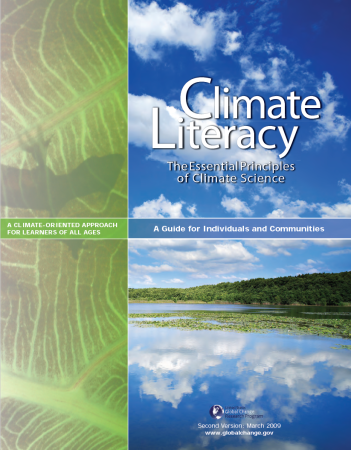ACTIONS
- Protect and safeguard cultural and natural heritage
- Learning and educational opportunities
- Cultural participation/social inclusion
- Sustainable tourism
- Support research
- Employment (recruiting, training, safety)
- Energy consumption, greenhouse gas emissions
- Waste management and reduction
- Transport (forms of, energy use)
- Commercial activities including copyright and IP
- Governance and management
- Security, disaster preparedness, risk reduction
- External partnerships and collaborations
- Toolkit/framework/roadmap
- Sign-post to other resource (database)
- Case studies
- Links to educational resources
NOAA Teaching Climate (Climate Literacy: the Essential Principles of Climate Science)

Intended Audience
Climate educators and communities, aimed at learners of all ages
- National Oceanographic and Atmospheric Administration (NOAA)
“Climate Literacy: The Essential Principles of Climate Science (2009) presents information that is deemed important for individuals and communities to know and understand about Earths climate, impacts of climate change, and approaches to adaptation or mitigation. Principles in the guide can serve as discussion starters or launching points for scientific inquiry. The guide aims to promote greater climate science literacy by providing this educational framework of principles and concepts.
Climate Literacy: The Essential Principles of Climate Sciences guide is now available in both English and Spanish.”
Avaiable in
- English
- Spanish
SDGs LINKAGES
Working to support the Principles contributes to a wide range of SDG targets, including:
4.4 (skills for work), 4.7 (Education for Sustainable Development), 12.8 (education for sustainable lifestyles), 13.1 (climate adaptation), 13.3 (climate education and institutional capacity) and 13.B (climate action for Global South countries).
Click on the SDG Target to discover Our Collections Matter indicators
-
Our Collections Matter indicators:
- Number of young people and adults in skills-development activities and programmes drawing on collections, for employment, decent jobs and entrepreneurship.
- Increase in number of young people and adults in such programmes.
- Number and proportion of staff who have received training in the last year, to better support their contribution to the SDGs.
- Programs and processes in place to ensure the availability of a skilled workforce.
-
Our Collections Matter indicators:
- Numbers of people in each type of programme drawing on collections from different demographic groups.
- Increases in numbers of people in each type of programme from different demographic groups.
- Proportion of people involved in such programmes in relation to overall audience size.
- Evidence that learners have acquired knowledge and skills to promote sustainable development.
-
Our Collections Matter indicators:
- Extent to which (i) global citizenship education and (ii) education for sustainable development (including climate change education) are mainstreamed in (a) national education policies; (b) curricula; (c) teacher education; and (d) student assessment.
- Extent to which global citizenship education and education for sustainable development (including climate change education) are mainstreamed in formal, informal and non-formal education programmes and activities drawing on and related to collections.
-
Our Collections Matter indicators:
- Plans in place for near and longer term to withstand and actively adapt to climate-related hazards and natural disasters.
-
Our Collections Matter indicators:
- Plans in place to enhance positive contributions to addressing climate change through use of collections. Plans in place to ensure collections, collections institutions and broader society can adapt effectively to climate change.
- Plans in place for effective education and awareness raising on climate change mitigation, adaptation, impact reduction and early warning.
- Plans in place to reduce negative contributions of collections-related functions, e.g. measuring greenhouse emissions with plans and targets in place to reduce them.
-
Our Collections Matter indicators:
- Number of initiatives (educational, awareness-raising, research, and/or partnerships) drawing on collections and collections-based institutions that build capacity for climate change planning and management in least developed countries and small island developing States.
- Number of targeted initiatives drawing on collections and collections-based institutions aimed at building capacity for women, youth and local and marginalized communities in least developed countries and small island developing States.
